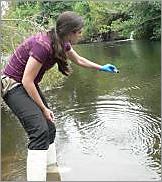
In 2015, Irene Bueno was awarded a Consortium Research Grant to study aquaculture in southern Chile. Dr. Bueno is a doctor of veterinary medicine who is now pursuing her PhD at the College of Veterinary Medicine at the University of Minnesota, focusing on ecosystem health and emerging problems within the human-wildlife interface. Aquaculture is a major economic activity in Chile, and has been increasingly criticized for the extensive use of antibiotics. Dr. Bueno’s Consortium-funded research illuminates the mechanisms by which antibiotic resistant bacteria (and associated genes) are released from freshwater fish farms into the aquatic ecosystem. An interdisciplinary team led by Dr. Bueno and her advisers, Drs. Randy Singer and Dominic Travis, collaborated with Chilean researchers and governmental officials to sample and analyze antibiotic resistant bacteria in river sediment, wastewater, and to understand the antibiotic use at the farms. Among the project’s outcomes is the development of a model that can be used to assess interventions that mitigate the dissemination of antibiotic resistance from the fish farms into the watershed. Regarding her research, Dr. Bueno notes, “Characterizing the way antibiotic resistant bacteria spreads through this watershed from sources such as fish farms, will help inform decisions related to waste management at the local level. On a broader scale, the data generated will contribute to advancing our knowledge of how antibiotic resistance is disseminated, bringing us a step closer to understanding the potential health consequences for humans, animals, and the ecosystem.” To learn more about our annual Consortium Research Awards, click here.